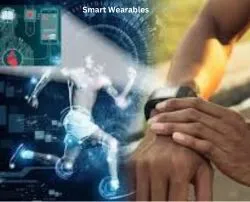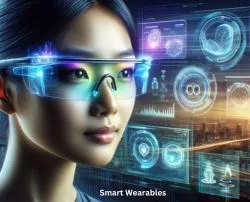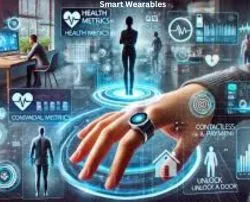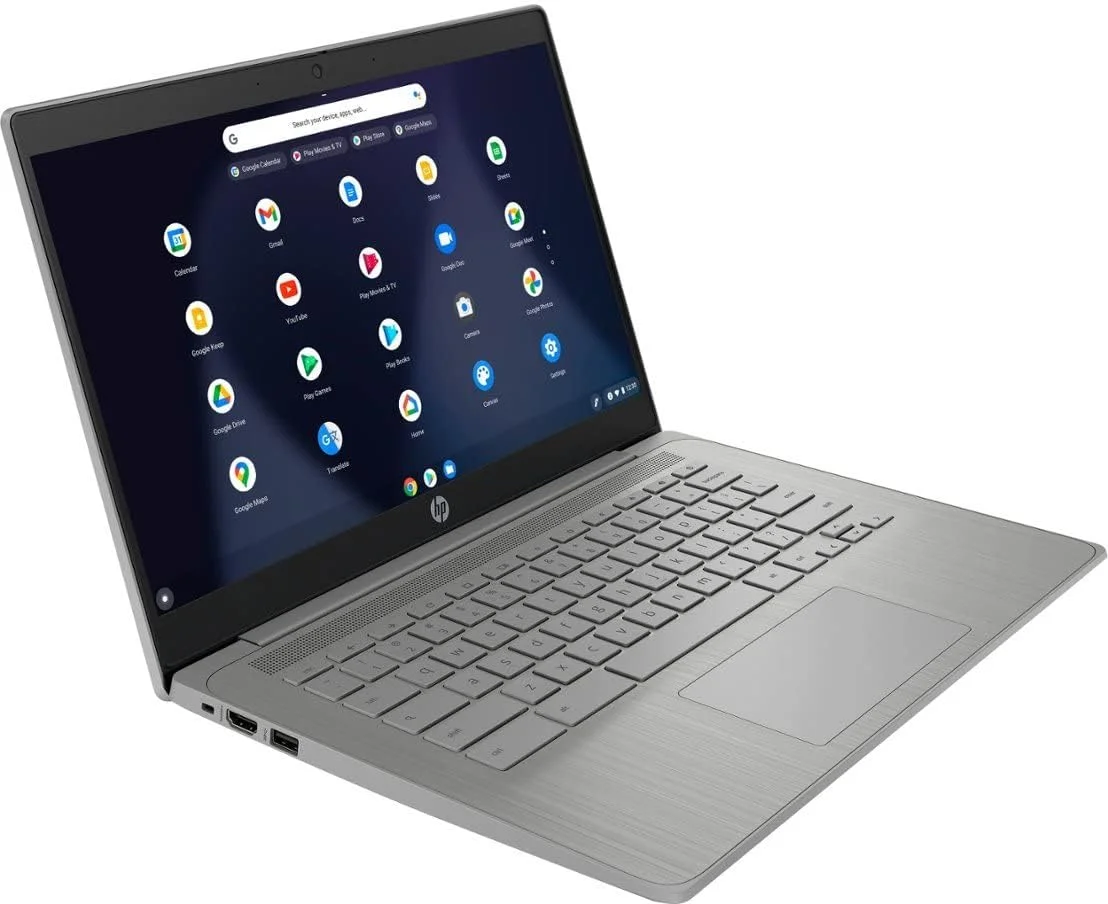Introduction
The evolution of smart wearables surpassed step counting capabilities to create AI-based devices which monitor wellness metrics and schedule organization as well as improve our relations with the external world. Artificial intelligence serves as the fundamental core of present-day smart wearables that allow these devices to become smarter and more indispensable tools of daily life. AI-powered smart wearables have reached a point where exploration of the future generation begins. This article examines prospective developments in revolutionary technological innovation systems.
The Evolution of Smart Wearables

From Simple Gadgets to AI-Driven Devices
Smart wearable technology first appeared as digital watches and pedometers evolved into modern form. Following fitness trackers arrived on the market along with smartwatches that performed both heart rate monitoring and notification functions. By integrating AI technologies into modern wearables people receive much more than basic health monitoring tools since these devices provide insights into their wellness and warn of oncoming health crises.
How AI Has Transformed Smart Wearables
The implementation of AI within smart wearables has developed these gadgets into time-critical health support tools and personal coaching systems and performance boosters. Machine learning enables these devices to evaluate significant personal information which allows them to detect patterns through which they offer customized recommendations for individual users.
Key AI Innovations in Smart Wearables

AI-Powered Health Monitoring
AI power in smart wearables helps users monitor their important health indicators which include heart rate along with blood oxygen levels along with ECG readings and stress levels. Wearable devices equipped with AI technology are able to recognize the first indicators of atrial fibrillation and sleep apnoea so users can get medical evaluation before conditions become serious.
Personalized Fitness Coaching
DIY generic workout plans no longer exist. Your fitness coaching adjusts automatically according to detection results from your exercise behaviours combined with heart rate and rehabilitation period. Such devices supply unique fitness plans together with real-time performance assessments while they identify safe rest intervals to stop injuries.
Smart Wearables for Mental Well-being
AI-powered smart wearables solution now plays an essential role in promoting mental health awareness which has finally received proper attention. These devices track stress markers through their monitoring systems while recognizing emotional trends so they deliver therapeutic exercises and mental orientation sessions to users for stress management.
Gesture and Voice Recognition
People now use AI-powered wearable devices which let users control them with their hand gestures. Your smartwatch becomes operable through wrist movement while smart glasses function by subtle head motions. The improved AI-enabled voice assistants Google Assistant and Siri help smart wearables operate in an easier and more responsive manner.
Sleep Tracking and Optimization
The analysis capabilities of AI-based sleep tracking ensure precise monitoring of sleep phases together with monitoring of disturbances and it delivers individual reports for improved sleep quality. Users can now discover sleep improvement techniques and bedtime activities among features available in some modern wearable devices alongside optimal wake-up schedule recommendations for improved daily energy levels.
The Rise of Smart Glasses and AR Integration

Smart glasses that are integrated with artificial intelligence have brought about a tremendous change in the way we perceive augmented reality (AR). We can now experience real-time translation, even more advanced navigation, and interactive virtual experiences have removed borders between these and humans. AI integration, that includes voice commands, facial recognition, and digital overlays, which now comes in a more personalized version, has enabled smart glasses to be applied in the day-to-day routine of people who once felt that cutting-edge technology was something out of this world.
AI in Smart Rings and Wearable Patches

Next-generation small AI-powered rings and wearable patches, which are among the most portable options in the wearable market, are the latest trend. These devices can keep an individual under constant watch, monitor water balance in the body, and diagnose fatal diseases very early stage. An AI-powered patch is among the most convenient ways of treating diabetes by keeping the patient’s blood sugar level within the necessary range but with a minimal amount of invasiveness.
Smart Wearables and IoT Connectivity

With AI being the focal point, smart wearables are now commingling the Internet of Things (IoT), which is the most important topic in the field of technology. What is more the wearables are also able to connect with smart home devices and thereby a user can have personal devices like sound system, alarms, security systems, and appliances adjusted based on their choices. The convergence of devices makes possible the operation of daily tasks in an almost invisible way which at its core would be a fully automated experience on a daily basis.
Privacy and Security Concerns

All these advances, however, come with growing concerns about privacy. AI-powered motion wearables collect vast amounts of personal data; they present security and ethical considerations. Some manufacturers are already developing measures such as improved encryption, anonymization techniques, and even data policies that are transparent and that protect user safety. But AI is getting better and data protection must keep up.
The Future of AI-Powered Smart Wearables

What does the future hold for smart wearables? Here are some exciting alternatives:
- Health Predictive Analyses: AI will help users take preventive health actions.
- Payments & ID with Biometric: Advanced biometrics may allow wearable technology to supplant conventional wallets and ID.
- Human Augmentation: AI wearables may help disabled individuals who have mobility, vision, or communication limitations.
- Influence of Quantum Computing: Smart Devices will become more responsive and intelligent as AI processing improves with the perpetual advancement of quantum computing.
Conclusion
AI wearables go beyond just being fashion statements, they are set to take a greater role in entertainment, health, and productivity. This crowning development promises without fail that smart wearables will evolve because with every innovation comes the development of increasingly responsive and intelligent devices. AI’s smart wearables with its augmented functions are definitely the future be it in improving well-being, bringing about change in a daily interaction, or redefining the experience of the world.
FAQs
Real-time health monitoring, personalized fitness coaching, AI-driven sleep tracking, gesture and voice recognition, and AR integration.
AI wearables track your vitals, analyse patterns and provide predictive insights so you can manage your health proactively. Some can even detect early signs of illnesses like heart conditions or sleep disorders.
While AI wearables collect personal data, manufacturers are working on encryption, anonymization and data security to protect user privacy.
Hyper-personalized health insights, biometric payments, smart rings and patches, and human augmentation for individuals with disabilities.
While AI wearables can help with early detection and health tracking, they’re not a replacement for doctors. They’re a tool to support medical professionals and personal health management.










